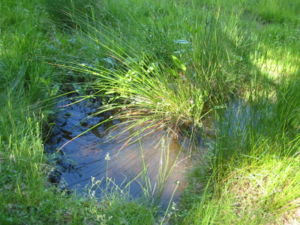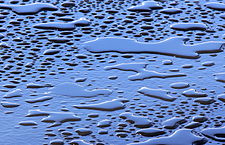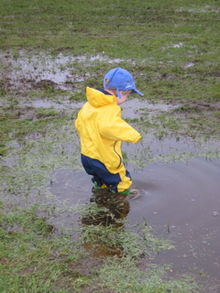- Puddle
-
This article is about the liquid phenomenon. For other uses, see Puddle (disambiguation).
A puddle is a small accumulation of liquid, usually water, on a surface. It can form either by pooling in a depression on the surface, or by surface tension upon a flat surface. They are often formed anywhere from rain water, in gardens from irrigation, and on municipal streets from urban runoff.
A puddle is generally small enough for an adult to step over, shallow enough to walk through, and too small to traverse in a boat or raft. Puddles can be a source of fascination for children, as well as attracting other small wildlife.
Contents
Natural puddles and wildlife
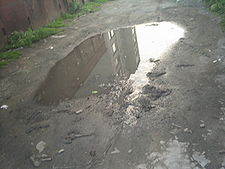 A small road puddle with reflections of buildings
A small road puddle with reflections of buildings
Puddles in natural landscapes and habitats, when not precipitation sourced, can indicate the presence of a seep or spring. They can provide essential moisture for small wildlife, such as birds and insects. Many butterfly (Lepidoptera) species need puddles for mud-puddling to obtain nutrients such as salts and amino acids, including some types that are endemic endangered species.
Swallows use the damp loam which gathers in puddles as a form of cement to help to build their nests. The reduction in the number of puddles in the countryside due to intensive farming, urban sprawl, and climate change is partially the cause of a decrease in the swallow population.
Wildlife uses puddles as a drinking source, a bath such as bathing birds, or in the case of some smaller forms such as tadpoles or mosquito larvae, an entire habitat. Raised constructed puddles, bird baths, are a part of domestic and wildlife gardens as a garden ornament and "micro-habitat" restoration.
Small seasonal riparian plants, grasses, and wildflowers germinate with the ephemeral "head start" of moisture.
Artificial puddles and transportation
Puddles commonly form during rainstorms, and can cause problems for transport, especially when combined with cold conditions to form patches of ice, which are highly slippery and difficult to see. Due to the angle of the road, puddles tend to be forced by gravity to gather on the edge of the road. This causes the notorious 'splash' as cars drive quickly through the puddle, which causes water to be sprayed onto pedestrians on the adjacent pavement. Sometimes, irresponsible drivers do this deliberately, which, in some countries, can lead to prosecution for careless driving.[1]
Puddles commonly form in potholes in a dirt road, or in any other space with a shallow depression and dirt. In such cases, these are sometimes referred to as mud puddles, because mud tends to form in the bottoms, resulting in dirtied wheels or boots when disturbed.
Puddle management
Puddles tend to evaporate quickly due to the high surface area-to-volume ratio, allowing a large number of molecules to be vaporised at once, and as such tend to be short lived. However, due to this property, puddles of chemicals such as bromine, which produce highly toxic vapour, are highly dangerous and spills such as this must be dealt with immediately, with emergency evacuation as a common step.
In order to deal with puddles, roads and pavements are often built with a camber (technically called 'crowning'), being slightly convex in nature, to force puddles to drain into the gutter, which has storm drain grates to allow the water to drain into the sewers. In addition to this, some surfaces are made to be porous, allowing the water to drain straight through the surface to the aquifer below.
Puddles which do not evaporate quickly can become standing water, which can become polluted by decaying organisms and are often home to breeding mosquitos, which can act as vectors for diseases such as malaria and of more recent concern in certain areas of the world, West Nile Virus.
Physics
In the physics context puddles may refer to where a liquid forms into patches on top of a surface of a solid material.
History
Medieval legend spoke of one man who was desperate to find building materials for his house, so he stole cobblestones from the road surface. The remaining hole filled with water and a horseman who later walked through the 'puddle' actually found himself drowning. A similar legend, of a young boy drowning in a puddle that formed in a chuckhole in a major street in the early years of Seattle, Washington, is told as part of the Seattle Underground Tour.
When Walter Raleigh met Queen Elizabeth I, Raleigh is reputed to have thrown his coat over a muddy puddle to allow the Queen to cross without getting her feet wet. Such activities were once part of chivalry, but are less common nowadays.
Military
In military terminology, puddles are "liquid terrain obstacles deprived of tactical importance". In military slang, "the Puddle" may also refer to the Pacific Ocean, much as the Atlantic Ocean is referred to as "the Pond".
Recreation
Puddles are often a source of recreation by children, who regard jumping in puddles as an "up-side" to rain. A children's nursery rhyme records the story of Doctor Foster and his encounter with a puddle in Gloucester.
Puddle theory
Puddle theory was devised by Douglas Adams to satirize the Fine-tuned Universe argument for supernatural creationism.[2][3] As quoted in Richard Dawkins' eulogy for Douglas Adams:[4]
... imagine a puddle waking up one morning and thinking, "This is an interesting world I find myself in, an interesting hole I find myself in, fits me rather neatly, doesn't it? In fact it fits me staggeringly well, must have been made to have me in it!" This is such a powerful idea that as the sun rises in the sky and the air heats up and as, gradually, the puddle gets smaller and smaller, it's still frantically hanging on to the notion that everything's going to be all right, because this world was meant to have him in it, was built to have him in it; so the moment he disappears catches him rather by surprise.
See also
- Puddling (biology)
- Puddling (engineering)
- Puddling (metallurgy)
- Rill
- Seep (hydrology)
- Spring (hydrology)
Notes
- ^ Driver fined over puddle splash BBC News, 31 October 2005.
- ^ Williams, Robyn (18). "The anthropic universe". The Science Show (ABC Radio National). http://www.abc.net.au/rn/scienceshow/stories/2006/1572643.htm. Retrieved 19 November 2009.
- ^ Redfern, Martin (24 December 1995). "Proofs of God in a photon". The Independent. http://www.independent.co.uk/arts-entertainment/proofs-of-god-in-a-photon-1527306.html. Retrieved 19 November 2009.
- ^ Dawkins, Richard (17 September 2001). "Eulogy for Douglas Adams". Edge. http://www.edge.org/documents/adams_index.html. Retrieved 19 November 2009.
References
- Adler PH (1982) "Soil and puddle visiting habits of moths" Journal of the Lepidopterists' Society, 36: 161–173.
- Allocco, Maria (1999) "Puddle of light" Phys. Teach. 37: 468.
- Diaza ME, Fuentes J, Cerroc RL and Savaged MD (2010) "An analytical solution for a partially wetting puddle and the location of the static contact angle" Journal of Colloid and Interface Science, 348 (1): 232–239. doi:10.1016/j.jcis.2010.04.030
- McLachlan A and Ladle R (2001) "Life in the puddle: behavioural and life-cycle adaptations in the Diptera of tropical rain pools" Biological Reviews, 76 (3): 377–388. doi:10.1017/S1464793101005723
- McLay CL (1978) "Competition, coexistence, and survival: a computer simulation study of ostracods living in a temporary puddle" Canadian Journal of Zoology, 56: (8): 1744–1758. doi:10.1139/z78-239
- Padua L (2011) Distinguishing in a puddle the water from two rains: A crucial methodological issue Clinical Neurophysiology, 122 (7): 1277. doi:10.1016/j.clinph.2010.12.054
- Royston, Angela (2005) Water: Let's Look at a Puddle Heinemann/Raintree. ISBN 9781403476852.
- Satake K (1977) "Disappearance of puddle water during the night with growth of ice needles and its reappearance during the day" Nature, Letter, 265: 519–520. doi:10.1038/265519a0
- Zavarzin GA and Alekseeva TV (2009) "A puddle: an ombrophilic cyano-bacterial community " Microbiology, 78 (4): 468–473. doi:10.1134/S0026261709040109
- Weiss, Peter (2004) "Piddly puddle peril: Little water pools foil road friction" Science News, 166(20): 308. doi:10.2307/4015763
Ponds - Ash pond
- Balancing pond
- Ballast pond
- Beel
- Cooling pond
- Detention pond
- Dew pond
- Evaporation pond
- Garden pond
- Ice pond
- Immersion pond
- Kettle pond
- Melt pond
- Mill pond
- Raceway pond
- Retention pond
- Sag pond
- Salt evaporation pond
- Sediment pond
- Settling pond
- Solar pond
- Stabilization pond
- Stepwell
- Stew pond
- Stormwater management pond
- Polishing pond
- Tailings pond
- Tarn
- Treatment pond
- Waste pond
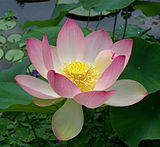
Pools Puddles Biota - Beaver pond
- Common pond skater
- Common puddle frog
- Duck pond
- Fish pond
- Goldfish pond
- Koi pond
- Lotus
- Pond heron
- Pond lily
- Pond snail
- Pond turtle
- Pondweed
Ecosystems - Freshwater ecosystem
- Lake ecosystem
- Lentic ecosystem
- Pond ecosystem
Related topics - Aerated pond
- Bakki shower
- Big fish–little pond
- Body of water
- Full pond
- Hydric soil
- Phytotelma
- Pond aeration
- Pond of Abundance
- Pond liner
- Ponding
- The Pond
- Puddle (M C Escher)
- Spring
- Swimming hole
- Water garden
- Water Lilies (Monet)
- Water well
Categories:- Bodies of water
- Springs
- Limnology
- Habitats
- Bird feeding
- Butterflies
- Ecological restoration
Wikimedia Foundation. 2010.

